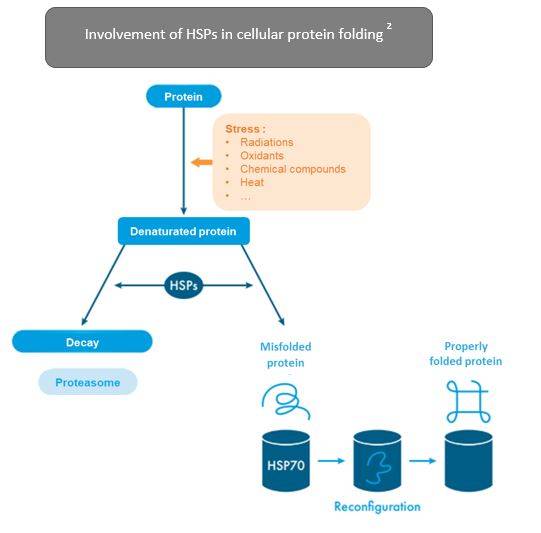
HSP: Proteins that help our cells fight against cellular stress
Stress
Whatever the cause: nutritional, biochemical, bacteriological, viral, thermal, psychological or environmental, stress causes alterations in cellular functions. This is without counting on the HSPs (Heat Shock Proteins) whose role is to deal with these different cellular stresses.
HSPs: Their objective is to limit cellular stress
Also known as "chaperone proteins", HSPs are protective proteins that ensure the proper functioning of cells. They help to cope with the deleterious effects of cellular stress, which can be caused by physical parameters (excessively high temperature, UV irradiation, exposure to heavy metals, etc.) or biological parameters (infection, hypoglycaemia, anoxia (lack of oxygen in the body's tissues), oxidative stress, etc.).
These different cellular stresses cause the denaturation and accumulation of proteins, leading to a loss of their biological activities.
The proteins then no longer perform their functions within the cells and are likely to bind anarchically to each other. It should be noted that these agglomerates are particularly difficult to eliminate. They are also known to cause accelerated cell ageing, but also for their involvement in certain pathologies such as cardiovascular diseases, metabolic diseases such as type 2 diabetes, cancers and neurodegenerative diseases.1
HSPs, whose main family corresponds to HSP70, have the task of allowing proteins to regain their biological activity or to avoid their accumulation in cells.
Note that the body's capacity to produce HSPs decreases with age, so supplementation is essential.
Numerous scientific studies have been conducted on HSPs and have identified certain nutrients and bio-actives capable of inducing their expression3
Based on these studies, Laboratoire THERASCIENCE has developed PHYSIOMANCE HSP Complex, an innovative and synergistic combination of 2 bio-actives (ETASTM and HMB) and a trace element (zinc).
- The asparagus extract ETASTM
PHYSIOMANCE HSP Complex provides an ETASTM deposited asparagus extract with inducing effects on the production of HSP70. Its effectiveness has been demonstrated in clinical studies carried out on humans in the context of acute cellular stress. Our ETASTM asparagus extract has the advantage of being standardised and titrated in active ingredients: asfural, derived from hydroxy-methyl furfural (HMF), and "asparaprolines"4, derived from proline (amino acid).
Thanks to its effect in inducing the synthesis of HSP70, ETASTM has rapid beneficial effects, particularly in states of emotional shock, by helping to reduce cortisol, known as the "stress hormone",5 and in states of thermal shock (in the event of sunburn, for example), by exerting a beneficial action on the suppression of pro-inflammatory cytokines.6
- Zinc
This trace element induces the synthesis of HSP707-8. Indeed, it has been shown that a zinc deficiency is directly linked to a decrease in HSP production.
Zinc is also involved in genome stability: it is involved in particular protein motifs called "zinc fingers". Proteins with these motifs have a particular conformation and are able to interact with DNA and contribute to its synthesis and repair.
- HMB
A metabolite of leucine, HMB (calcium β-hydro-β-methylbutyrate) modulates the induction of HSPs.9 It is known that leucine deficiencies decrease the expression of HSP7010 'precursors', and thus of HSPs themselves. HMB therefore helps to restart the synthesis of HSPs. In addition, HMB supplementation helps to combat the alterations in cellular stress induced by intense physical exercise.
Thus, HMB acts in synergy with ETASTM and zinc to intervene in the regulation of protein folding and degradation mechanisms via HSP.
PHYSIOMANCE HSP Complex is therefore ideal for dealing with various situations of "cellular stress" :
- Thermal stress : heat stroke, sunburn, fever, burns, dehydration
- Infectius stress : bacterial and viral infections, convalescence, etc.
- Metabolic stress : acute inflammation, alcoholism, exposure to toxic molecules, ischemia
- Physical stress : post-traumatic, post-operative recovery, bruising and muscle pain, intense exercise
- Phycological stress : burn-out, emotional shock, depression
ETASTM is a registered trademark of Amino Up Co., Ltd., JAPAN
Bibliography
- Toth M et al. Heat shock proteins and their role in human diseases. Acta Biol. Szegediensis, 2015,59 (Suppl ;1) :121-141.
- David JC et Grongnet JF. Les protéines de stress . INRA Prod Anim. 2001,14(1),29-40.
- Soares Moura C et al. Dietary nutrients and bioactive substances modulate heat shock protein (HSP) expression : a review. Nutrients, 2018,Jun ;10(6).
- Inoue, Shoichiro, et al. “Isolation and Structure Determination of a Heat Shock Protein Inducer, Asparagus-Derived Proline-Containing 3-Alkyldiketopiperazines (Asparaprolines), From a Standardized Extract of Asparagus Officinalis Stem.” Natural Product Communications, Mar. 2020.
- Ito T et al. Effects of ETAS on HSPs 70, stress indices, sleep in healthy adult men. J Nutr. Sci Vit-am.2014,60, 4 : 283-290..
- Shirato T et al. A standardized ETAS prevents reduction in HSP70 expression in UV B irradiated normal human dermal fibroblasts : an in vitro study. Environ Health Prev Med , 2018, 23,1 :40
- Putics, Akos et al. “Zinc supplementation boosts the stress response in the elderly: Hsp70 status is linked to zinc availability in peripheral lymphocytes.” Experimental gerontology vol. 43,5 (2008): 452-61.
- Pardo Z et al. Supplemental Zinc exerts a positive effect against the heat stress damage in intestinal epithelial cells: Assays in a Caco-2 model. J Functional Foods, 2021,83, 104569
- Chou, Shiuh-Dih et al. “mTOR is essential for the proteotoxic stress response, HSF1 activation and heat shock protein synthesis.” PloS one vol. 7,6 (2012).
- Hensen SM et al. Heat shock factor 1 is inactivated by aminoacid deprivation. Cell Stress Chaperones 2012 ;17(6) :743-755.












Recommandé par mon médecin, je l'utilise régulièrement, avec de tvoir plus
Avis du 28/09/2024, suite à une expérience du 11/09/2024 par Silvia S